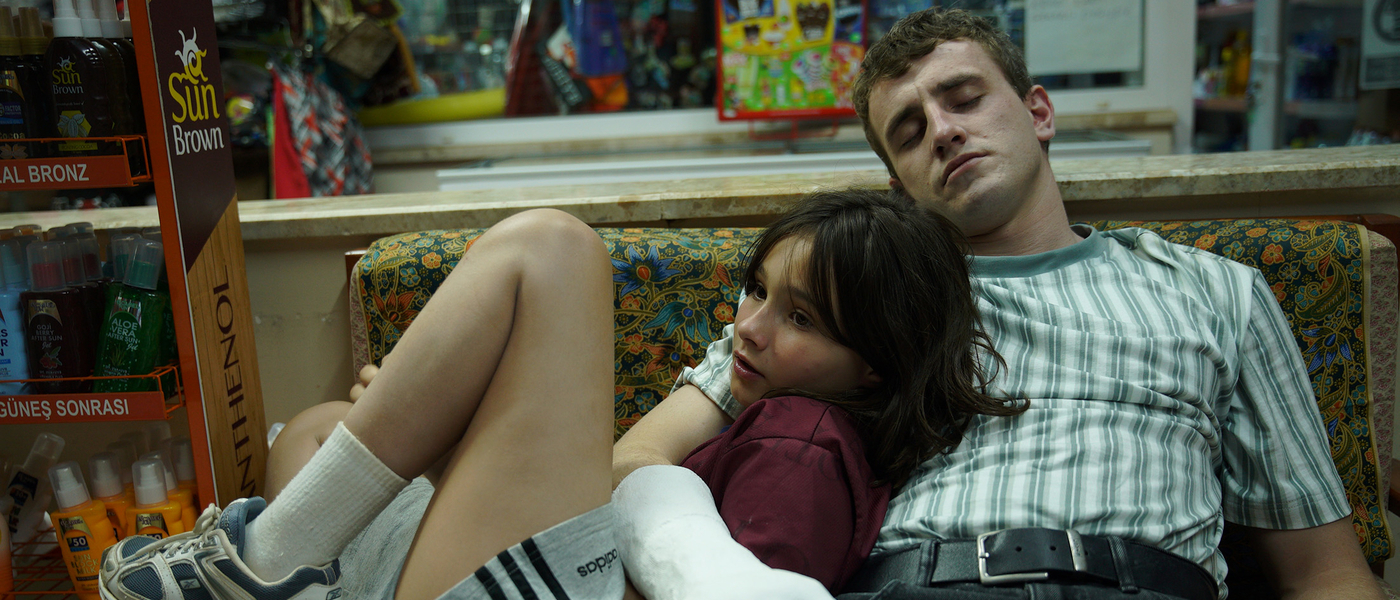For my 11th birthday, my mom decided to take me on a vacation to San Diego. What she didn’t tell me at the time was that after months of remission, her cancer had returned. While the trip was lovely, the experience was consumed by the events that followed it. By the time the cancer finally retreated for good, I firmly hit puberty and entered a decade-long haze that only ended upon both coming out and transitioning.
Recognizing that I was trans didn’t come from experimentation, but by finally being able to re-evaluate my past. Being a woman explained so much about why I reacted to the horrors of adolescence in the way I did. I didn’t cover myself while swimming for modesty’s sake. I just hated people staring at my chest. My calm demeanour was less a consequence of stoicism as it was owing to a long tradition of lesbian chivalry. I realized that identity is a narrative made from memories, often assigned meaning by the needs of the present.
It’s this sentiment that guides Charlotte Wells’s incredible film Aftersun, which won the French Touch Prize of the Jury at Cannes last year, and scored an Oscar nomination for lead actor Paul Mescal. The film follows Sophie (Frankie Corio), both as a precocious child and reflective adult, as she recalls she took with her father, Callum, in her youth. Wells has stated that the film is semi-autobiographical, and is her own attempt to re-create a man who is no longer in her life through old photos and camcorder video.
While both Sophie and I went on similar trips at eleven, what struck me more upon first watching was the dual connection I felt with both protagonists. Like Sophie, I am a young woman looking back and trying to make sense of my past. However, there is also an aching sadness in Callum that I know only because I experienced that kind of loneliness myself. While Aftersun is a film about the inability to recover a lost parent, it also spoke to my own inability to recover the man I once thought I was.
In my understanding of my past, there is a schism. Certainly, I lived through my experiences, but they were shared with someone named Ethan, a stopgap persona I inhabited before coming out, and who acted as a protector of sorts.
Callum is similar. In Sophie’s recollections of her father, his whole life is devoted to protecting her and preparing her to be an adult. Early into the film, Callum teaches Sophie how to break free from a potential assailant, insisting that she take the practice seriously. Watching the film, there is a sense of dread that something horrific will happen, but that moment never comes. Aftersun is very light on plot or action, because it’s more concerned with documenting the subtle way in which a parent begins to separate from their child and allows them to make their own way in the world. It’s a film about one becoming two, and the impossibility of two ever becoming one again.
While the film begins with Sophie and Callum together, bonding over a shared disinterest in the veritable kitsch of their tour guides creating forced sincerity, a rift eventually appears between them. While Sophie attempts to drag her father on stage to sing a karaoke duet of R.E.M.’s “Losing My Religion,” Callum cannot bring himself to be under the gaze of his peers. While his daughter finds a moment of sincerity, it is not enough to override the internal anguish he feels. As Sophie sings, the words sink in: “Oh, life is bigger/ It’s bigger than you/ And you are not me.”
The resort itself functions as a condensed testing ground for these new social interactions. Adolescents like Sophie can play at being adults without suffering consequences like economic hardship, divorces or time lost to a soul-sucking job. For young people, it’s a space to express rebellion while still remaining part of a larger social order. Like summer camp, the space invites unspoken rites of passage like having a first sexual experience or a taste of alcohol, and Sophie spends much of her time embedding herself into the social dramas of a group of vacationing teenagers.
While she finds community, Callum is most comfortable in the moments where he’s removed from the watchful eyes of his peers. He calms himself through tai chi, and is entranced by a carpet salesman’s pitch that each rug tells a story. Like in the 1999 film Beau Travail (a clear influence on this film), Callum is alienated from a traditional conception of Western masculinity, and often seems to be on the trip only as a service to Sophie. While the resort provides opportunities for adolescent social rebellions, there are still limits to the extent of that rebellion, primarily when it comes to queerness.
Late into the trip, Callum leaves Sophie to walk around the town. As Sophie stands on the balcony of their apartment complex waiting for him to return, she notices two boys her age in a doorway across the street, furiously kissing and feeling one another up. Unlike the camcorder footage she records, the moment is fleeting and only exists in memory; as is the conversation Sophie has with her father about what he was like at her age. Callum deliberately turns off Sophie’s recorder and the two talk, reflected on the black screen of a turned-off television set. No one wants to remember the painful parts of their youth; the aching desires never consummated. They remain as half-remembered dreams. Sophie will never be able to re-create Callum from the documents she has. She will never fully understand who her father was. She can only approximate, and leave the rest up to interpretation.
As time moves forward, it becomes harder and harder for me to understand who Ethan was. While we may have once shared a body, he no longer belongs in it. The intellectual framework needed to support his existence has broken. As the evidence I once had of myself as male or even bigender fades, so does he.
So here I am, like Sophie, and Wells herself, sorting through corrupted files and SD cards, searching through static to try and find the memory of a man who left without a proper goodbye, and deliberately limited the amount of time he was recorded. Perhaps he, like Callum, was ashamed of his existence.
Maybe there is a world where Ethan lived, and Emma died. Maybe there is a world where we made a compromise and both lived. However, the moment has passed. Ethan made the choice to leave me alone on a dancefloor four years ago, and only now I am trying to make sense of the void he left.
Like Sophie, I am angry at this man, for the time he took from me, for the years he spent wallowing in self-pity, and for the people he inevitably hurt through lack of self reflection. However, with time, I am beginning to understand him a little bit better. Here was an 11-year-old boy tasked with protecting the fledgling identity that would become Emma, as well as our mother, diagnosed again. Ethan isn’t real. He was always destined to fade, like dissolvable stitches or a Polaroid. He carried me through that hazy decade and landed me safe on the other side, bearing all the horrors of being a closeted queer teen.
It’s better to remember him before, as an 11-year-old boy on vacation in San Diego, smiling for the camera, posed in front of a battleship. He’s got a smug grin that, with the help of Gina Gershon in Bound, will eventually grow into a sly lesbian smirk. He’s happy.
May Ethan’s memory be a blessing.


 Why you can trust Xtra
Why you can trust Xtra


